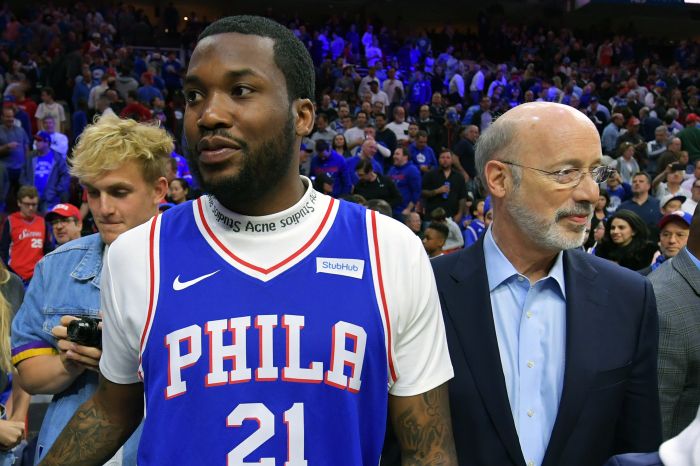Tuesday night felt like a victory. Meek Mill, who has spent the last five months in jail for violating his probation, was finally out of jail. He got one of the grandest homecomings we’ve ever seen. The Philadelphia 76ers owners flew Meek via helicopter to game 5 of the team’s first-round matchup with the Miami Heat. Then suited him up with a Joel Embiid jersey and had him do the ceremonial ringing of the Liberty Bell while the MC’s classics played over the loudspeakers. It was a cultural moment for Hip-Hop, basketball and black Americans happy that someone caught up in a corrupt system was finally allowed to see some freedom. But when the dust settled, the confetti from the 76ers’ win was cleaned up and Meek partook in whatever post-game turn-up was on deck, we still had to come to grips with two important facts: Meek Mill still isn’t free and there are millions of black men and women in America trapped in a prison system that will never grant them even the brief respite the rapper enjoyed last night. And many will die in unjust bondage.
The reason Meek Mill’s case has gotten so much attention – beside the fact he’s a celebrity – is the way that it exemplifies how probation, paroles and the system of mass incarceration only act to keep black men and women from freedom. To recap: Meek Mill was arrested a decade ago for allegedly pointing a gun at a cop, evading the scene and having drug paraphernalia in his possession. Since then, he’s become a successful artist, businessman and philanthropist in the city. But due to the conditions of his probation stemming from that 2008 conviction, he wasn’t allowed any slip ups. He had to be perfect. He wasn’t.
Mill violated probation by failing to get proper approval before going on tour (because you have to get all of your travel approved when you’re on probation), failing a drug test, being in the vicinity of a fight at the airport when a fan allegedly swung first and riding four-wheelers in the street. Read that list again. None of those violations are actual crimes worthy of jail time but alas, when you’re in the probation system, any imperfection is means to face more jail time. And that’s exactly what happened to Meek Mill, which is why he’s spent the last half a year in jail.
But he’s out. For now. On unsecured bail, which means he still has yellow tape, court dates and money to pay to keep him out in the short term. In the long term, he’s still on the same restricted lifestyle he received a decade ago. And think about all it took to get Meek just this far. Jay Z led marches for him. Millionaires and billionaires advocated for him and he had high-powered lawyers working for him. Just one black man. And he still isn’t free.
Now think about the millions of black Americans who are on parole or probation – one-third of the 4.65 million people under such circumstances are black despite black people only making up 13 percent of the population. These brothers and sisters don’t have millionaire endorsers and marches organized for their freedom. Nor do the have the money to pay for bond. They just sit in jail cells and rot with little fanfare.
Think about, for instance, the story of Kalief Browder, who spent more than 1,000 days in jail without even being charged. A time that was so traumatizing for him that he committed suicide. There are 450,000 people held in jail daily who can’t pay bond to get out of jail, regardless of what crimes they were accused of committing or if they even committed said crimes.
In short, there are just so many black people in jail who shouldn’t be there, falling victim to a system that is built to keep them incarcerated until they die. So the question I have is for the millionaires and philanthropists and businessmen – the Robert Krafts and Michael Rubins of the world – who patted themselves on the back last night for getting one singular black man out of jail. What are they going to do for the rest of us? Are they done with Meek or are they really willing to disrupt the prison industrial complex that is just a perpetuation of American slavery? Because if they stop at Meek Mill, without confronting the deep-rooted systemic racism that put him in this position in the first place, then last night’s celebration is mostly symbolic. If these supposed allies are willing to create real change and do the work necessary to make it happen, then that’ll really be even more cause for celebration.









Comments
Bossip Comment Policy
Please read our Comment Policy before commenting.